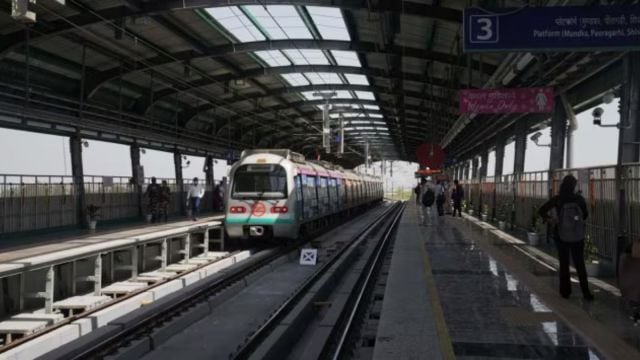Delhi-Meerut RRTS: Full ops by June, here’s the latest update on the super-fast corridor
For the first time in India, precast track slabs have also been used at track turnouts — junctions where trains can switch from one track to another
 The Delhi–Meerut RRTS, spanning 82 kilometers, is being developed at a cost of over Rs 30,000 crore.
The Delhi–Meerut RRTS, spanning 82 kilometers, is being developed at a cost of over Rs 30,000 crore. The National Capital Region Transport Corporation (NCRTC) has completed the installation of all 169 track km (TKM) of precast slab track on the Delhi-Ghaziabad-Meerut corridor of India’s first semi-high-speed Regional Rapid Transit System (RRTS).
Precast slabs are those that are manufactured elsewhere and then brought to the site, instead of being manufactured on the site.
According to NCRTC, the work involved the production and laying of nearly 47,000 high-precision precast concrete slabs that will form the base of the railway tracks. These have been installed across both elevated and underground sections of the corridor.
For the first time in India, precast track slabs have also been used at track turnouts — junctions where trains can switch from one track to another. A total of 135 such turnouts, involving eight different configurations and 15 slabs each, have been installed.
In total, the project used slabs of 140 different types, making logistics and inventory management a major challenge during execution.
The track system is designed to support trial speeds of up to 180 kmph and an operational speed of 160 kmph.
At present, trains are undergoing trial runs at higher speeds on certain sections. Officials said that the track’s performance is critical to safety and reliability in a high-speed rail system, especially since such systems lack redundancy — there is usually no backup track available in case of failure.
The slab track system was selected through a detailed process involving international technology transfer. From design and equipment selection to training and troubleshooting, the system provider was involved throughout the implementation phase.
Currently, 55 km of the corridor — from New Ashok Nagar in Delhi to Meerut South in Uttar Pradesh — has been commissioned and is operational.
Trial runs are underway on other stretches, with the entire 82-km corridor expected to become fully operational by June 2025.
A timeline of the project
-October 2023: 17-km Priority Section between Sahibabad and Duhai Depot inaugurated
-March 2024: 17 km stretch between Duhai and Modinagar North inaugurated
-August 2024: Meerut South RRTS Station operationalised
-January 2025: 13 km stretch between Sahibabad and New Ashok Nagar inaugurated by PM Narendra Modi
-June 2025: Complete Delhi-Meerut corridor expected to be operational







